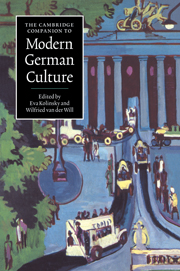Book contents
- Frontmatter
- In search of German culture: an introduction
- 1 The citizen and the state in modern Germany
- 2 German national identity
- 3 Elites and class structure
- 4 Jews in German society
- 5 Non-German minorities, women and the emergence of civil society
- 6 Critiques of culture
- 7 The functions of 'Volkskultur', mass culture and alternative culture
- 8 The development of German prose fiction
- 9 Modern German poetry
- 10 German drama, theatre and dance
- 11 Music in modern German culture
- 12 Modern German art
- 13 Modern German architecture
- 14 German cinema
- 15 The media of mass communication: the press, radio and television
- Index
7 - The functions of 'Volkskultur', mass culture and alternative culture
Published online by Cambridge University Press: 28 May 2006
- Frontmatter
- In search of German culture: an introduction
- 1 The citizen and the state in modern Germany
- 2 German national identity
- 3 Elites and class structure
- 4 Jews in German society
- 5 Non-German minorities, women and the emergence of civil society
- 6 Critiques of culture
- 7 The functions of 'Volkskultur', mass culture and alternative culture
- 8 The development of German prose fiction
- 9 Modern German poetry
- 10 German drama, theatre and dance
- 11 Music in modern German culture
- 12 Modern German art
- 13 Modern German architecture
- 14 German cinema
- 15 The media of mass communication: the press, radio and television
- Index
Summary
The three concepts of Volkskultur, mass culture and alternative culture are seminal for an understanding of the history of German modernity. They reflect different conceptions of the popular and it is important to outline their functional significance within the development of German cultural, ideological and political history. Special attention is to be paid to the authors of high culture as both promoters and critics of popular culture in order to highlight the negotiation of attitudes between the educated classes and the rest of the population. Paradoxically, the varieties of 'low' culture are in some respects creations of the same elites who otherwise insist on keeping the sophisticated and reflexive culture of the minority separate from that of the majority. Just as folk culture, mass culture and alternative culture spell out distinct phases within the trajectory of modernity, so the relationship between the cultural intelligentsia and the mass of the people changes. While the three basic forms of popular culture today stand for parallel and intermixing trends within the diversification of contemporary civilisation, they arose within successive historical conjunctures which were laden with both liberating and fatal potential. The ideological functions of popular culture reveal most conspicuously the contradictory set of hopes and prejudices as well as the antagonistic discourses which accompanied civil society as it unfolded in Germany during the past couple of centuries.
- Type
- Chapter
- Information
- The Cambridge Companion to Modern German Culture , pp. 153 - 171Publisher: Cambridge University PressPrint publication year: 1999



